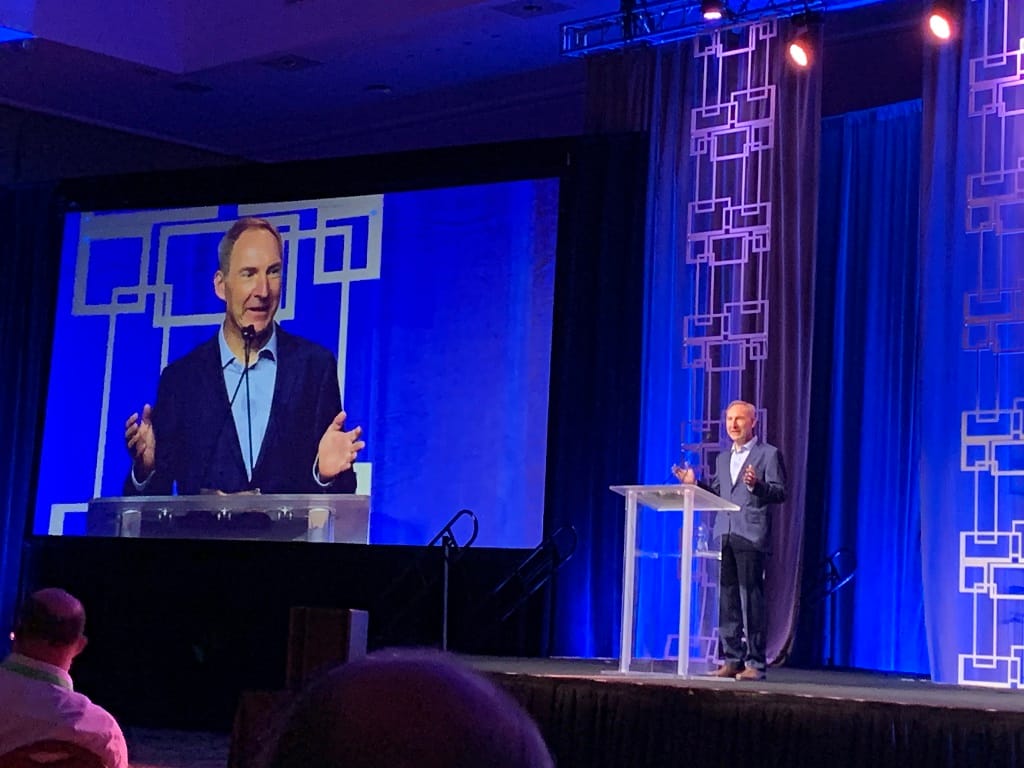Pushing Gigabit, FBA President Says Debate over Megabit Speeds ‘Silly’
At Fiber Connect, Garry Bolton said he is optimistic fiber will prevail over other tech for connectivity.
Benjamin Kahn

August 2, 2021—The president and CEO of the Fiber Broadband Association, which hosted the Fiber Connect 2021 conference last week, sat down with Broadband Breakfast to discuss what he sees as the promising future of fiber despite other technology-focused companies pushing their solutions to bridge the digital divide.
Gary Bolton, who has led the organization since November 2020, said in an interview on the first official day of the conference last week that the speed debate currently being discussed in Congress is not adequately addressing what is truly needed for future connectivity.
“Debates about 100 Megabits per second are kind of silly compared to the Gigabit speeds [the FBA] is talking about,” Bolton said.
Congress has been inundated with proposed legislation that would raise the speed threshold to address connectivity gaps exacerbated by the pandemic. In March, the Democrats proposed tiered service level connections, with anything below 100 Mbps download as low-tier. The current federal standard is 25 Mbps download and 3 Mbps upload.
Conversation should be on gigabit, not 100 Megabit
Over the course of the Fiber Connect conference, many panels and keynote speakers did not even discuss 100/100 Mbps symmetrical speeds, and instead were talking about the differences between 1 Gbps service and 10 Gbps service, in between discussing the potential of 100 Gbps services.
This is despite some arguing that increasing the speed definition for underserved would actually be a disservice.
Bolton said he believes there are considerable efforts being made by the wireless and cable industries to disrupt progress made by the fiber industry, but he is confident that fiber is gaining momentum across the country.
“Progress is rarely linear—the pendulum swings both ways, but right now it seems to be in our favor.”
But advocates of a more diverse technological approach have suggested that while fiber could lead the way, other technologies provide important compliments. In fact, some have suggested that fixed-wireless – using mobile wireless technologies for home internet — is critical for rural broadband deployment. The Wireless Infrastructure Association, meanwhile, have said that Congress must support multiple technologies for deployment.
Bolton credited new fiber technologies, strategies, and legislation for allowing its price to continue to drop while bandwidth continues to increase—particularly in rural areas that have been historically underserved or unserved.
“Wallstreet is beginning to reward fiber providers, particularly during the pandemic,” Bolton said.
Fiber after coronavirus
Bolton stated that more people are beginning to appreciate and understand the value of highspeed internet, especially when services like telehealth became a matter of life and death for many communities at the height of the pandemic.
He said that in his opinion, certain things will not be the same post-pandemic, “We are never going back to work the same way we were before the pandemic,” he continued, “The future of work and healthcare have been changed forever.”
Fiber Connect 2021 a success
Bolton said he is glad some things are going back to “normal,” and that he was thrilled about the success of the in-person event.
Though he said that he initially harbored some concerns as to whether enough people would turn out for Fiber Connect 2021, he was quickly relieved of those notions when the resort sponsoring the convention asked the FBA to close registration early for fear that their facilities would not be able to accommodate the influx of guests.
Overall, he said that he was very pleased at the level of excitement and interest Fiber Connect 2021 had stirred up, and that he was looking forward to another in-person Fiber Connect 2022.









Member discussion